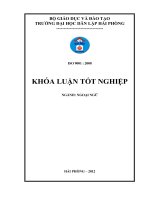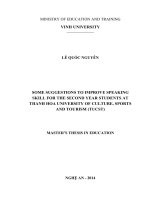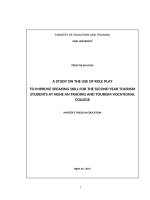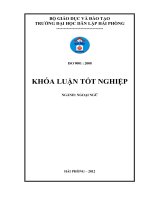Using language games to improve speaking skill for the students in the class 7c at nhu ba sy secandary school
Bạn đang xem bản rút gọn của tài liệu. Xem và tải ngay bản đầy đủ của tài liệu tại đây (136.87 KB, 20 trang )
.
INDEX
Title
A. Introduction.
B. Problem solving
I.
Basis reality (Reality)
II.
Basis of theary.
III. Solution
IV. The tested results
C. Conclusions and recommendation.
Reference
Page
2
4
4
4
5
15
17
20
A/ INTRODUCTION
Nowadays English has played an important part in our life. It has been
considered as an international language all over the world, it has become a
compulsory subject in all secondary schools as well. It is the key for anyone who
wants to get success in life. In fact, secondary students in particular and people
learning English in general, despite many years of learning English, their ability to
1
.
communicate is very limited. They can not know how to express what they want to
say. They are shy and they are not confident enough to speak or communicate with
the others in English even though they still understand vocabulary and the sentence
structures. Students are learning self-contained method. They mainly focus on
mastering grammar and forget speaking skill, the school speaking environment is
little known even without. The reason for this is partly due to their limited
vocabulary. On the other hand, because of the assessment requirements of the
department, the students mostly
have to take part in written test in favor of
grammar rather than the oral test . Therefore, the students often learn conception to
pass the exams, not learn to communicate. Besides, the students are often afraid of
making mistakes when presenting dialogues or expressing their comments on the
issues to be presented to the crowd. But perhaps, the basic cause is that the
students are lack of communication environment: the teachers of English are
Vietnamese, the class is also Vietnamese students, so Vietnamese should be used
when they can’t express something in English. The majority of the teachers pay
little attention, or rarely encourage the students to develop speaking skill, the
students do not have the habit of speaking English. That is why, in the process of
teaching, especially for English pilot program, I have been thinking about "How to
improve the students’ speaking skill ? », « How to help students to be self confident
enough to communicate with one another in English? » I have found out that the
use of language games in teaching English is one of the most effective methods to
get the students involved in speaking English. Moreover, using language games
makes the lessons more interesting and the students more active in learning
English. The speaking environment is promoted more and more. For the above
reasons, I have chosen the theme « Using language games to improve speaking
2
.
skill for the students in class 7C at Nhu Ba Sy Secondary School ». Please be
shared to consult colleagues and additional comments.
B / PROBLEM SOLVING
I.Basis reality (Reality)
Today the use of English in communication is essential and important.
English not only helps us to develop economic, society, but also helps us integrate
3
.
with our friends throughout the world. English is useful for many different reasons:
We may use English when traveling or working abroad. If we know English, we
can find a good job easily, we can trade with other countries in English around the
world to do business, economic development. Knowing English helps us
understand the songs, read books, watch movies, watch TV programs in English.
But in fact, secondary students in particular and people learning English in general
have not learned English boldly and confidently to communicate in practice. In
order to help the students use English to communicate in everyday life, the teachers
need to innovate teaching methods, pay attention to promoting language
environment at school. However this is not an easy matter for both the teachers
and the students. It is important for the teachers to know how to select the specific
language games in the appropriate classes of objects, the ability of the students to
meet the efficiency. The teachers should always encourage the students to
participate in learning activities and practice communicating to make the lessons
exciting, lively, and attractive. They can form the habit of communicating in
English .
II. Basis of theory
In fact, in teaching and learning a foreign language, the students will learn
more effectively if they are learnt in an atmosphere of learning fun, relaxation and
have more opportunities to communicate in the context of the real world. The use
of language games in teaching a foreign language can increase motivation for the
students, one of the decisive factors for the students to get success in their language
learning. At the same time, the teachers can help and encourage the students to
learn and maintain their interest in learning. In addition, language games also help
the teachers create the context in which language practice is very useful and easy.
4
.
The students would like to participate in the games, they have to understand what
the others are saying, and they have to say these things to present their own
opinions or to present information to the others understand. So, in this theme, I
want to mention some games organized to encourage, promote and improve
speaking skill for the students in class 7C at Nhu Ba Sy secondary school.
III. Solution
In every period of teaching process I often have the students play games
such as Networks, Slap the board, Matching, Simon says, Lucky numbers, Lucky
stars, Who is the millionaire?, Hang man, Car racing, Survey , Chain game…. But
in this theme, I would like to introduce some following language games I find most
effectively in motivating the students in class 7C at Nhu Ba Sy secondary chool to
practice speaking skill.
1.Challenging Game.
Purpose: Review the thematic vocabulary and practice speaking skill.
The teacher devides the class into two teams, then takes out the topic of
vocabulary. Two teams huddle within 30 seconds and turn to challenge your team.
Which team is more challenging than the number of words will have the right to
speak first. If any team says enough and the right amount of challenge wil be
scored 1 point. If the team says one wrong word or says one word that does not
belong to the topic or does not say enough times challenged, the team will lose the
challenge and points. The prize will belong to the other team.The game will be
resumed with different themes. The game will stop when the set time has expired or
the teacher has checked all the required test scores.
Example 1: Unit 2: Health – Lesson 2: A closer look 1.
5
.
(7 English Program Pilot).
The teacher gives the topic “Health problems” and devides the class 7B into
two groups. Then the teacher asks the students to play “Challenging game” to
warm up the class and lead in the new lesson.
(The students are really keen on this game because the students like
challenging and they are afraid of leaving behind their friends. They have
expressed their quickness and liveliness in speaking English than ever before).
Example 2: Unit 3: Community service – Lesson 1: A closer look1.
(7 English Program Pilot).
The teacher gives the topic “Prolems in the society” such as “homeless
people”. Then the teacher devides the class 7B into four groups and asks the
students to play “Challenging game” to consolidate the lesson.
(In this game, I really felt pleased because the students were excited to talk
about the “Problems in the society” and the speaking environment is improved
as well).
2.Face to face game.
Purpose: Practice the students’ reflexes and agility skills in communication.
In this game, the students work in pairs, stand face to face with their partner,
think about the topic of the lesson, the new words they have learned above. To start
the game, S1 says a new word and S2 says the first related word that comes to
mind, keeps the words going back and forth as quickly as possible until the teacher
says “stop”.
Example 1: Unit 2: Health – Lesson 2: A closer look 2.
6
.
(7 English Program Pilot).
-The teacher asks the students to play a game “Face to face” to consolidate
the lesson. Whole class stand up. In pairs, stand face to face. One mentions to
Health problem and the other mentions to Health tip. The students take in turns.
(In this game, not only good students but also weak students are involved.
The whole class take part in the game and pairs by pairs complete their task. So,
this game makes the lessons interesting, exciting and makes the whole class
enthusiastic. They have to think of what to say how to respond their partner ).
Example:
S1: Obesity.
S2: Eat less junk food.
S3: Sunburn.
S4: Wear a hat when going out.
S5: Spots
S6: Wash your face regularly.
S7: Stomachache.
S8: Be careful with what you eat and drink.
S9:Flu
S10: Wash your hand more
……………………..
Example 2: Unit 3: Community service – Lesson 1: Getting started.
(7 English Program Pilot).
7
.
- The teacher asks the students to play a game “Face to face” to consolidate
the lesson. Whole class stand up. In pairs, stand face to face. One mentions to a
noun and the other mentions to a verb to make meaningful word phrases related to
the topic “Community service”. The students take in turns.
Example:
S1: Blood.
S2: Donate.
S3: Homeless people.
S4: Help.
S5: Donate.
S6: Books.
S7: Poor children.
S8: Teach
………………………
3.Gossip game.
- The teacher reads a statement that only the student who sits at the top of
each group can hear but the others can not.
- The first Student repeats the teacher’s sentence to the other student, so on
until the last student of the group hears and repeats the teacher’s sentence. Which
one reads the complete sentence aloud will win the game.
Example: “Non-renewable energy” means that it will run out if we use it.
(This game requires the students to say the whole sentences, so it helps
them drill two skills: Listening and speaking. Moreover, this game helps the
8
.
students form the habit of speaking the long sentences in English and
encourages them to be self-confident to communicate with the others in English)
4. Word – practicing game.
The teacher gives any English words, using their letters to create meaningful
words. In this game, the students have the opportunity to "scour all of the words" in
their heads, avoid forgetting, and they will be able to enlarge vocabulary from the
game which their partners have created. The teacher can ask the students to make
up sentences, using the words created if there is enough time.
(In this game, I am very surprised because the students are so intelligent
that they can create too many words from the letters of any words given.
Therefore, this game helps the students become quick-minded, consolidate
vocabulary and develop speaking skill, These are some examples to show the
students’ result)
Example 1: Unit 11: Sources of Energy - Lesson 1: Getting started
(7 English Program Pilot).
- The teacher asks the students to create meaningful words from the word
“Resource”.
S1: Use.
S2: Reuse.
S3: Source.
S4: Sour.
S5: See.
S6: Our.
S7: Seer.
9
.
S8: Course.
…….
- The teacher asks the students to make up sentences, using above new
words.
Example 2: Revision Lesson (7 English Program Pilot).
- Ask the students to create new words from the word “Environment”
(It is very amazing that students can creat too many meaningful words
from the letters of the word “Environment”)
10
.
Ten
To
Net
Toe
Move
Meter
Ton
Teen
Invent
On
Note
One
Tenor
Mine
Into
In
Time
Meet
Mr
More
Event
River
Meat
Even
Enter
Minor
Ever
Mote
Never
Over
Vote
Tin
Men
Iron
Tree
Remote
Rent
Remove
Movie
Example 2: Revision Lesson (7 English Program Pilot).
- Ask students to create meaningful words from the word “Celebration”
(It is incredible that the students can create too many meaningful words from the
letters of the word “Celebration”)
11
.
Can
Been
Ice
On
None
It
Rat
Ear
Tea
Tire
Tie
Lie
Tear
Race
Lent
Bear
Ban
Rent
Rate
Bee
Rice
Rain
Beat
Ten
Learn
Beer
Teen
Table
Bore
Enter
Boat
Bet
Cable
Bat
Center
Air
Bar
Nice
Clean
Cat
Role
Clear
Car
Note
Able
In
Aunt
Into
Elect
Cane
Care
Lion
Crab
Train
5. Continuing a story.
The Teacher will give out a topic for the story and the beginning sentence
(which can take even the theme of the lesson that day). In turns, the students will
12
.
add a sentence to the story and they have to ensure the logic as well as sticking to
the theme of the story.
(In this game, I require good stusents make up new sentences and weak
students repeat the sentences. So the students don’t find this game too difficult at
all and this game helps the students improve their speaking skill considerably)
Example 1: Topic: Traffic (Unit 7: Traffic – Lesson 4: Communication
(7 English Program Pilot)
Nowadays, there are many kinds of means of transport.
S1: It is very convenient for us to travel.
S2: But too many means of transport mean too much pollution.
S3: There are often traffic jams during rush hour as well.
S4: The more vehicles there are, the more polluted it is.
S5: We should use public transport instead of our own private ones.
S6: We should go to school on foot or by bike.
……………………………….
Example 2: Topic: Saving energy. (Unit 10: Sources of energy – Lesson 4:
Communication (7 English Program Pilot)
There are two types of energy.
S1: They are renewbale and non-renewable sources.
S2: Renewable sources of energy are wind, hydro, solar or biogas.
S3: Non- renewable sources of energy are coal, oil, natural gas.
S4: Renewable sources of energy are plentiful and unlimited.
S5: But non- renewable sources of energy are limited.
13
.
S6: We are using up non- renewable sources of energy.
S7: It is necessary that we should save non- renewable sources of energy.
S8: We can save non- renewable sources of energy by using alternative
sources.
S9: We can use Solar energy instead.
S10: Solar energy doesn’t cause pollution.
S11: Solar energy can be cheap, clean and effective.
……………………….
6. Car racing.
(This is a great game to help the students learn and play as well. It is an
effective method to help the students review vocabulary. The teachers can apply
when starting or ending or reinforcing the lessons. Playing time is from 3 - 5
minutes).
Make three lines to create two parallel tracks and the tracks are divided into
equal rectangular areas (The students can perform on rough paper) to play a long
time, depending on who makes it possible to add multiple lines different race.
Initially two "riders" (Ex rider 1 writes "car", rider 2 "train") then draw ballot
to choose the team go ahead. The students have to write the word whose first letter
is the last letter of the enemy’s words.
The race will end when a rider is "flat tire" that means he/ she gives the
wrong words or the word already given before or can not find the word any more.
In this game teachers can act as an arbitrator, give the points and divide the
class into two teams together or two individuals together.
Example:
14
.
Racer I
Donate
phone
draw
teach
photo
rise
nail
eagle
nose
Racer II
help
end
eat
wrap
hear
origin
enlarge
learn
enrich
IV/ THE TESTED RESULTS
In this school year, I have been teaching English in class 7B. In every period
of teaching, I always use language games to improve speaking skill for the
students. I found that these language games have provided the students with the
comfortable and effective way of learning English not only in the classroom but
also in anywhere. The students feel excited and they are eager to wait for English
classes. They can understand the lessons more deeply and more naturally. They
have become
better and better at speaking skill and more self confident in
communicating in English with each other. They either speak English in the class or
outside the school confidently. They not only take part in language games
organized by the teacher but also by themselves. They even take use of their recess
to communicate in English by playing language games. Their speaking skill has
improved so quickly. Based on the results of the students’ learning, I have the
results of classification ability of speaking and communicating of the students in
class 7C at Nhu Ba Sy secondary school in this school year as the followings:
Early year
Ability
Number
Percentag
e
Late year.
Number
Percentag
e
Excellent
1
2,3
8
18,2
Good
6
13,6
26
59,1
15
.
Average
11
25
10
22,7
Bad
26
59,1
0
0
C/ CONCLUSIONS AND RECOMMENDTIONS
16
.
Learning a language is a process that requires students’ continuous efforts
and language games create fun learning environment, enhance relaxation and
maintain their interest in learning. At the same time, they increase the motivation,
encourage the students to be active to participate in learning activities.
Language games are useful for the students to enrich vocabulary and develop
the language elements such as pronunciation, spelling, reading, listening,
speaking .... These factors are very important to them before practicing
communication skills. The language games provide the students with the
opportunities to communicate in the context of real communication to improve
their speaking skill.
One of the difficulties that most of the teachers of foreign languages in
general, and the teachers of English in particular have experienced while using the
games, It is the time taken. Usually the games held in the classroom does not take
much time, which only takes 3 minutes to 5 minutes, or 7 minutes. Featuring that,
classes in Vietnam are often very crowded, whether using language games in
groups or in pairs is suitable and effective for all the students in the class to
practice the language is a problem. This shows that the selection of appropriate
language games is very important, which helps the students overcome the difficulty
in speaking English.
In short, using the language games brings efficiency in teaching and learning
English. The teachers should use the games as an indispensable part of the teaching
process, constantly organize language games for the students to participate in class,
create the atmosphere of English learning fun, relaxation, enthusiasm and
enjoyment. In addition, the teachers should focus on the selection of suitable
language games for the studentss levels. The language games will become more
17
.
difficult if the request, or the subject of the game is not appropriate or beyond the
students’ ability. Obviously, the language games like these are not beneficial for
both teachers and learners. In oder to get success in using language games in
teaching English, these are important things to both teachers and students.
1.For the teachers:
- Must have a deep understanding about the lessons.
- Must refer many kinds of books, documents.
- Must be responsible, enthusiastic for the students.
- Must prepare the means and appliances of teaching carefully.
2.For the students
- Must prepare the lesson carefully before class.
- Must meet all kinds of books for class service.
- Must obey the instructions and guidance of the teacher.
3.For the leaders
The current means and teaching aids for the English subject are not still
supplied enough. So the leaders should equip adequate equipments such as radios,
tapes, pictures, projector and especially functional rooms in order to suceesfully
carry out the objective of teaching and learning English in this stage.
The above is my own experience in using language games in teaching English
to improve speaking skill for the students in class 7C at Nhu Ba Sy secondary
school. But the language games that I would definitely present can’t help avoiding
limitations. I look forward to all the colleagues’ constructive feedback in order to
18
.
improve the efficiency of class time, contribute to improving the quality of teaching
and learning English.
I sincerely thank you!
Thanh Hoa, May 12 th, 2017
CONFIRMATION OF THE I assure this is my own initiative experience. I do not
HEADMASTER
copy the other people's content.
(Name and full name)
Pham Ngoc Thanh
19
.
REFERENCES
1. Students’ and teacher’s 7 English Program Pilot books.
2. Brown, H.D. (1994). Teaching by Principles: An Interactive Approach to
Language Pedagogy. Englewood Cliff, NJ: Prentice Hall.
3. Byrne, D. (1978). Teaching Oral English. Longman, London.
4. Lee, W.R. (1979). Language Teaching Games and Contexts. 21 Oxford Press.
5. Rixon, S. (1981). How to use games in language teaching. Macmillan Education.
20









